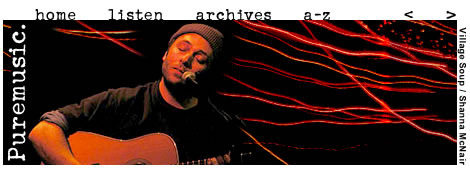
A CONVERSATION WITH KELLY JOE PHELPS (continued)
PM: So where did you first run into Bill Frisell along your road?
KJP: He came out one day in Seattle when I was pulling an in-store out at Borders, I think it was.
PM: No kidding!
KJP: Yeah. [laughs] It was a funny thing. I mean, it was the worst in-store I'd ever done, or ever had, because--
PM: Why, are there good ones?
[laughter]
KJP: I didn't say that.
[laughter]
PM: Yeah, right, but this was a particularly bad one.
KJP: The worst of all the bad ones. The guy who was in charge of bringing whatever minimal P.A. gear we were going to use showed up with two things: a guitar amp and a microphone stand.
[laughter]
PM: "We're off to a good start, buddy."
KJP: So I tried to blast out four or five songs, just acoustically cover this gigantic store. And I was trying not to act pissed off.
PM: You were trying not to kick his ass.
KJP: [laughs] So I was putting my stuff away afterward and kind of glancing around, and I recognized Frisell straight off, of course. And I thought, "Oh, damn, what's he doing here...?" I thought maybe he was just shopping for records. But he walked right over to me and introduced himself and told me that he'd been a fan, and that he'd been listening to my records and stuff. So we got to be friendly right away and started talking about wanting to play music together.
PM: I love the tunes on the record with the Zubot and Dawson crew, but the two with Frisell and Keith Lowe absolutely turned me inside out.
KJP: Yeah, man. Those guys are nuts.
PM: I mean, come on. That guitar interplay was magic.
KJP: Yeah, that--he's a pretty good player.
[laughter]
PM: Yeah, I noticed that.
KJP: He's got a few things going on.
PM: He can really put them notes together.
[laughter]
PM: Did you just track that together, and did you have eye contact, or--
KJP: Yep. Yeah, we were sitting probably five feet apart, and got down in there. Yeah, I mean, listening to "Cardboard Box of Batteries"--
PM: Yeah.
KJP: --I want to say this as humbly as possible, but when I listen to that, I can actually step outside of it and not hear myself, and hear the two guitars, and I can't quite get over how they played into each other.
PM: Your record didn't arrive until last night, so this morning I got up at 5:00, and I said, "Okay, I got to get inside this record, here." And I fired up some coffee and I put the headphones on.
KJP: All right.
PM: And I hardly ever do that with records. I'm always at the computer, and it's playing in my computer. And geez, that's a shitty way to listen to records.
KJP: Yeah, right.
PM: But I said, "Okay, let's get inside this record," and I plugged the earphones in. When I got to the Frisell tunes, I went, "Holy shit, I think I'm going to flip out, it sounds so good." [laughs]
KJP: Oh, man. Yeah, he just killed it.
PM: Yeah, well, so did you. It was that chemistry. What was he playing, his Klein or...? (kleinelectricguitars.com)
KJP: I don't think it was, actually. I think he did bring it to the session, but I believe he was playing--I don't remember, to be honest with you.
PM: Did he go through a rack full of stuff or direct into the board?
KJP: Well, on that "Cardboard Box" tune, all the straight guitar stuff, I think he played that with probably his basic setup, which he had plugged into an amp. And I think he had some sort of coloration going on, just for his tone. But then he took another pass doing that loop stuff.
PM: Yeah, what was he using to loop it, do you know?
KJP: I wish you could tell me. I mean, he had a--
PM: A Boomerang or an Echoplex, or--
KJP: He had just a box of junk there. And I mean, it was amazing, because a lot of the stuff he did is just one pass. And I don't know how he does that, because he'll play a note or two notes, and then he just starts pushing buttons and moving knobs.
PM: Right.
KJP: And what I can't get over is the way the thing sounds orchestrated, and he improvised that. And I don't know how someone can do that on the fly.
PM: Yeah, those looping guys, it's amazing how it becomes the whole art of building something that, "Oh, yeah, and then I'm going to take it here, and bring that back in and change this to that, and then add this."
KJP: Yeah.
PM: That's a whole beautiful art. But it takes a long time, I think, to get good at it.
KJP: Yeah, I would think so.
PM: But
I really, really loved what you guys did together.
continue